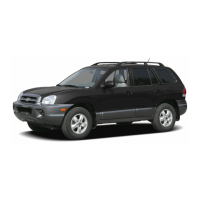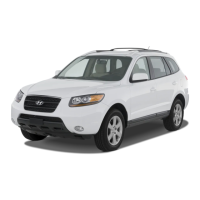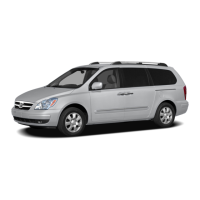Do you have a question about the Hyundai 2007 Veracruz and is the answer not in the manual?
Provides guidance on how to effectively use the owner's manual, including understanding its layout and key sections.
Details the types of unleaded fuel recommended and cautions against using specific fuel additives like methanol.
Explains specific design characteristics that affect handling, like higher center of gravity and cornering limitations.
Outlines recommended precautions for the initial period of vehicle use to ensure optimal performance and longevity.
Identifies and explains the various warning and indicator lights found on the instrument cluster.
Provides a detailed diagram and list of interior components and their locations within the vehicle cabin.
Identifies various controls and indicators located on the vehicle's instrument panel.
Illustrates and labels the key components found within the vehicle's engine compartment.
Details the adjustment procedures for front, second, and third-row seats, including headrests and armrests.
Explains the proper use, restraint system, and precautions for seat belts to maximize occupant safety.
Describes the operation, components, and safety precautions related to the vehicle's air bag system.
Information on key identification, operations, and warnings related to ignition key usage.
Details the functions and precautions associated with operating the smart key system.
Explains how to lock, unlock, and operate the tailgate using the remote keyless entry system.
Describes how to operate the door locks from both inside and outside the vehicle.
Details the operation of power windows, including auto up/down and lock functions.
Explains the operation of power windows, auto up/down features, and safety precautions.
Covers power steering operation, tilt steering adjustments, and easy access functions.
Instructions for adjusting rearview mirrors and warnings related to rear visibility.
Provides an overview of the instrument cluster, including gauges and indicators.
Explains the function of the speedometer, tachometer, engine temperature gauge, and fuel gauge.
Details how to read and use the odometer and tripmeter functions for tracking mileage.
Lists and explains various warning lights and indicators on the instrument panel.
Covers the operation of the car's audio system, including radio, CD player, and XM satellite radio.
Provides safety information, system overview, and setup instructions for the rear seat entertainment system.
Covers essential checks and preparations before operating the vehicle.
Explains the different ignition switch positions and their functions.
Provides instructions and safety precautions for starting the vehicle's engine.
Details the operation of the automatic transaxle and its gear selection.
Explains the AWD system, its modes, and driving considerations for AWD vehicles.
Covers power brakes, brake failure procedures, parking brake operation, and ABS.
Instructions for setting, increasing, decreasing, and canceling cruise control speed.
Provides driving suggestions to improve fuel economy and reduce maintenance costs.
Offers guidance for driving in hazardous conditions like snow, ice, mud, and at night.
Highlights SUV design characteristics and provides safety tips to reduce rollover risk.
Covers important points and safety rules for towing a trailer with the vehicle.
Explains how to determine vehicle weight ratings, capacity, and loading limits.
Explains the function of the hazard warning flasher and its usage in emergencies.
Provides instructions for handling a flat tire while driving.
Troubleshooting steps for when the engine does not start or turns over slowly.
Detailed instructions and safety precautions for jump-starting a vehicle's battery.
Steps to take if the engine temperature gauge indicates overheating.
Explains the TPMS malfunction indicator and low tire pressure telltales.
Guides on changing a tire with TPMS, including precautions for repair agents and tire sensors.
Provides instructions and cautions for towing the vehicle, including AWD and 2WD procedures.
Identifies and locates key components within the engine compartment.
General advice on performing maintenance and the importance of authorized service.
Provides an overview of owner maintenance tasks and a schedule for checks.
Outlines maintenance schedules for normal and severe usage conditions.
Details the recommended maintenance intervals for various vehicle systems.
Instructions for checking and maintaining the engine oil level and type.
Guidance on checking coolant level, recommended coolant types, and changing the coolant.
Instructions for checking the brake fluid level and warnings about handling brake fluid.
Details the filter replacement procedure for the air cleaner.
Explains the filter inspection and replacement procedure for the climate control system.
Guidance on inspecting and replacing windshield and rear window wiper blades.
Provides instructions for battery service, recharging, and precautions for handling batteries.
Covers tire care, inflation pressures, rotation, alignment, and replacement.
Information on fuse types, replacement procedures, and warnings.
Explains the purpose and location of the Vehicle Identification Number (VIN).
Details the information found on the vehicle certification label, including VIN.
Provides information on recommended tire sizes and inflation pressures.
Outlines consumer information prepared in accordance with NHTSA regulations, including dealer contact details.
Instructs consumers on how to report vehicle safety defects to NHTSA and Hyundai.
Lists the overall dimensions of the vehicle.
Specifies the wattage for various exterior and interior light bulbs.
Provides details on tire sizes, wheel sizes, inflation pressures, and lug nut torque.
Lists recommended lubricants and fluids for the engine, transmission, and other systems.
Provides guidance on selecting the appropriate engine oil viscosity based on temperature.
| Brand | Hyundai |
|---|---|
| Model | 2007 Veracruz |
| Category | Automobile |
| Language | English |











